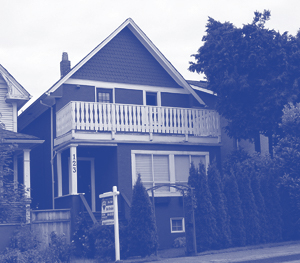(originally published in 2010, updated to 2017) By Bob Bracken
 The following Case Study illustrates an answer to the title question, ‘’Vancouver Real Estate, can prices go any higher?” This question has been asked over and over in the many years that I have been in the business. The answer is always a matter of supply and demand, economic climate and the political climate in British Columbia. Having said that, prices have consistently advanced over the past 50 odd years in Vancouver Residential Real Estate (See Website Article “The Older You Get The Richer You Get”). This case study was done in 2010. Below is a brief summary update regarding value performance for this property to 2017.
The following Case Study illustrates an answer to the title question, ‘’Vancouver Real Estate, can prices go any higher?” This question has been asked over and over in the many years that I have been in the business. The answer is always a matter of supply and demand, economic climate and the political climate in British Columbia. Having said that, prices have consistently advanced over the past 50 odd years in Vancouver Residential Real Estate (See Website Article “The Older You Get The Richer You Get”). This case study was done in 2010. Below is a brief summary update regarding value performance for this property to 2017.
- Sale/Purchase Price August 2010: $803,500
- Current Assessed Value 2017: $1,574,000
- Capital Appreciation Factor 10%/annum: Gross $$/Wealth Gain: $770,500
(Not including mortgage balance pay down by tenants/income.)
Cash Flow Gain - Wealth Gain: This Wealth Gain does not include mortgage balance pay down by tenants/income, and the current cash flow returns which would increase each year as rental rates increased. The original mortgage balance of $602,600 would have been paid down to approx. $482,000 if mortgage rates remained at 3.6+/-% over the ensuing years, adding an additional $120,000 to the Buyer’s Wealth Gain. Continued increases for rental rates in this area & for this property indicate current monthly Net Operating Income could be in the range of $5,000/mo or over $60,000/yr, creating very decent net cash flows to the Owner.
The Property: A 2200 sq.ft., 3 level “character” house containing 6 bedrooms, 4 bathrooms and 3 kitchens on a 24.75’ X 112’ lot on West 12th (busy street) in the City Hall area of Vancouver. Built in 1910, the building is structurally sound, with partially upgraded plumbing, electrical, and cosmetic work. The accommodation is Top floor: 1 Bdrm suite; Main floor: 2 Bdrm, 2 Bath suite; and Basement: 3 bdrm suite; plus single car detached garage with electric service.
The Revenue: At closing, the house was delivered vacant. Area rents indicated that the monthly revenue should be Top floor: $1,100; Main floor: $1,500; Basement $1,550; Garage $250 = total of $4,400/mo or $52,800/yr. An expense ratio of 25% or $13,500/yr, gave Net Income = $3,300/mo or $39,600/yr.
The Sale: The Property was listed for $845,000, reduced to $799,000, and sold for $803,500 in August 2010, after 45 days on the market.
The Analysis (2010): Financing @ 3.6%, 5 year term and 25 year amortization was available. If the Buyer put down 25% ($216,000 including closing costs), the mortgage payment for $602,600 was $3,040/mo or $36,500/yr, giving a modest positive cash flow. Assuming an average annual net income increase of 3%, the 1st, 5 year-end holding period should give the Buyer’s financial position as: Mortage Balance=$520,900, Net Income= $3,825/mo or $46,000/yr.
This change in financial position provides “Mortgage Rate Insurance” for the Buyer, so that interest rates could rise to 7.5% before increased mortgage payments would cause the Buyer to be out of pocket and “feed” the investment - or be forced to sell it.
The Update (Dec 2013): As noted, this property sold in August of 2010, and is still owned by that Buyer. Presently, 3 years later, the property generates $5,000/mo (estimate $1,650/mo for owner’s main floor suite), with a 25% expense ratio, current net income = $3,750/mo or $45,000/yr - a compounded increase in net rental income of 4.35% since purchase date - better than predicted. At purchase in 2010, the Assessed Value was approximately $720,000; the 2013 Assessed Value for the house is $910,000, for an annual, compounded increase of 8.12%. If the 9% “historical” appreciation factor is applied over the 3 years, the computed market sale price would be $1,040,000 today, giving a 4.3% cap rate - a feasible likelihood. This deal was available for anyone in mid 2010. It is likely that there are properties available today that provide the same opportunity for Buyers.
Basic Real Estate Tips & Principles:
- Buy Something Sooner Than Later.
- Getting an acceptable deal is more likely to create wealth than waiting for the “perfect deal”.
- Great deals, in a strong market, are usually “made”, rather than “found”- or delivered
- If you want inflation and amortization schedules to work for you, you have to give them something to work with - and time to work.
Is there anything you want to know regarding real estate, please contact Bob Bracken at 604-220-2035 cell, 604-263-2823 office, or bob@bobbracken.com email.
Printable PDF of this article - click here.
All information while deemed to be correct, is not guaranteed
Copyright © 2018 All rights reserved Bob Bracken

